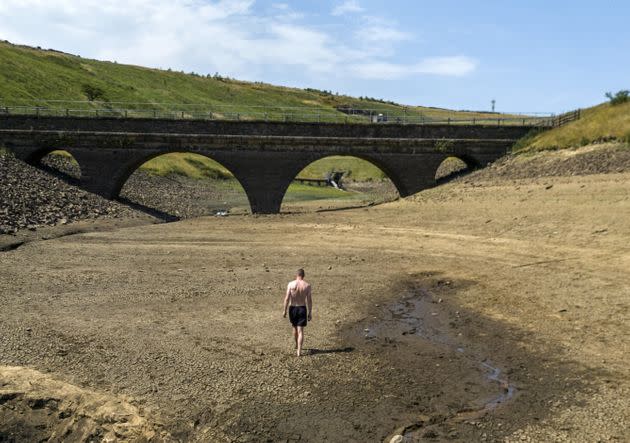When Is This Latest UK Heatwave Going To End?

The area surrounding the Dowry Reservoir close to Oldham is dry as the heatwave in the UK continues. (Photo: Danny Lawson - PA Images via Getty Images)
The hot weather is back this week after temperatures reached 40ºC in July for the first time ever in some places in the UK. On July 19 it hit 40.3°C at Coningsby, Lincolnshire, exceeding the previous record by 1.6°C, according to the Met Office.
Another heatwave it set to head to the UK in August. Although temperatures aren’t expected to reach 40 degrees, the heatwave is likely to last for seven days, making it longer than the previous hot spell. The heatwave is predicated to peak on Friday and Saturday, with temperatures possibly reaching 35ºC.
Parched parts of England are facing a hosepipe ban amid very dry conditions. Southern Water is asking customers “to limit your use to reduce the risk of further restrictions and disruption to water supplies, but more importantly to protect our local rivers”.
Parts of England saw the driest July in records dating back to 1836, following the driest eight-month period from November 2021 for the country since 1976.
The Met Office has warned there is “very little meaningful rain” on the horizon for parched areas of England as temperatures are set to climb into the 30s in the second week of August.
Brits are also being asked not to host barbecues in the dry conditions and there are fears fireworks and sky lanterns could spark “large-scale” fires in parched areas. At least 15 homes were evacuated on Saturday following a garden fire that got out of control in Essex where “multiple gardens, sheds, and outbuildings” were destroyed and several properties were damaged.
Around 40 people left their homes and seven were in need of treatment for injuries and smoke inhalation. “While summer weather usually provides the perfect opportunity to host a barbecue or gather around a chiminea in the evening, we’re strongly discouraging people from having any kinds of fires at the moment,” Neil Fenwick, area manager for Essex County Fire and Rescue Service, said.
But why are the temperatures so high?
A pressure system called the Azores High, which usually sits off Spain, has expanded and pushed further north, bringing hotter temperatures to the UK. Equally, climate change is to blame. Because there’s a reason the Azores High (and other pressure systems) are changing. This isn’t “just summer”, but it will become the norm for summer if we don’t move to cut carbon emissions.
A recent study suggested climate breakdown made the recent record heatwave 10 times more likely. Analysis by World Weather Attribution found that temperatures exceeded even those predicted by climate models.
“In fact, a new study suggests climate breakdown made the recent record heatwave 10 times more likely. Analysis by World Weather Attribution found that temperatures exceeded even those predicted by climate models,” Friederike Otto, a senior climate lecturer at the Grantham Institute for Climate Change, Imperial College London, said.
The UK’s red weather alerts in place last month signified a threat to health and infrastructure, which is why it’s important to take precautions to stay cool.
Professor Hannah Cloke, natural hazards researcher at the University of Reading, said it should also be seen as “a wake-up call about the climate emergency”.
“We have had heatwaves in the UK before, but the intensity of heat that has been forecast, which will either break UK records or at least get very close, is enough to kill people and animals, damage property, and hobble the economy,” Cloke said ahead of the record temperatures.
And the cost of staying cool isn’t cheap either. During the last heatwave, sales of electric fans increased by 1,630% in a week, according to the online marketplace OnBuy. But while a fan might help cool you down, they’re not cheap to use.
Uswitch estimates that running a 120w pedestal fan can cost around 3.4p per hour, which would mean leaving the fan on between 10pm and 8am can add 33p to your energy bills a day. Do that for the rest of the week and it could add up to £2.35 – 65p more than your summer bills for the same period in 2021.
Dr Steve Buckley, head of data science at Loop, told Wales Online: “At first glance, these costs may not seem that high on an hourly basis, but they can really add up if you’ve got a few devices running or you forget to switch them off. And many households need to do everything they can to lower their energy bills at the moment.”
This article originally appeared on HuffPost UK and has been updated.

 Yahoo Movies
Yahoo Movies 